Finance & IT Email Marketing: A Data-Driven Approach
February 2, 2026
Home >> Healthcare App >> The best AI-enabled hospital management system for your hospital
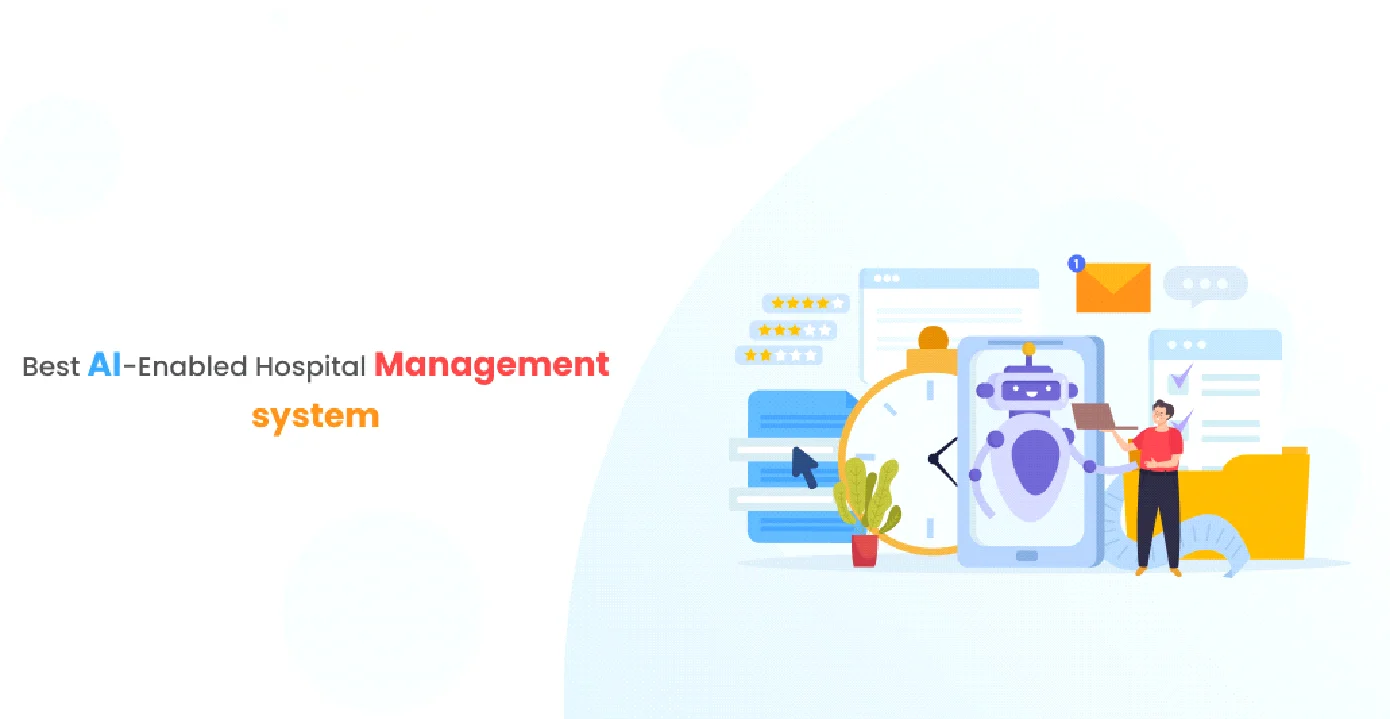
Quick Summary
Artificial Intelligence (AI) in healthcare has emerged as an emerging trend in the medical industry. It is incomparable with paper-based records due to their unique functionalities. Moreover, AI technologies have a drastic impact on hospital operations. It speeds up the process of hospital tasks while maintaining accuracy. Entirely transforms the healthcare services which create potency to double hospital revenue.
Artificial Intelligence (AI) enabled hospital management systems to have capabilities beyond one’s thinking. It solves healthcare challenges through its advanced functionalities. Simplifies the patient’s medical procedure from a time-consuming process to a time-efficient procedure. Similarly, medical practitioners are too satisfied with this AI implication in the healthcare industry.
It has versatile benefits including minimizing repetitive work, data-driven decision-making, medication discovery, lower administrative expenses, and early detection of severe disease. Furthermore, AI-enabled hospital management systems maximize the experience of medical practitioners, medical staff, and patients. As patients increase in hospitals, it’s troublesome to maintain data efficiently. Therefore, it raises the need for advanced medical technologies.
It integrates with diverse medical departments such as the outpatient department, in-patient department, administrative department, customer service department, pharmacy department, and more. These advanced technologies develop smart healthcare systems for better medical data analysis, automate hospital tasks, and informed clinical decisions for the prevention of health risks.
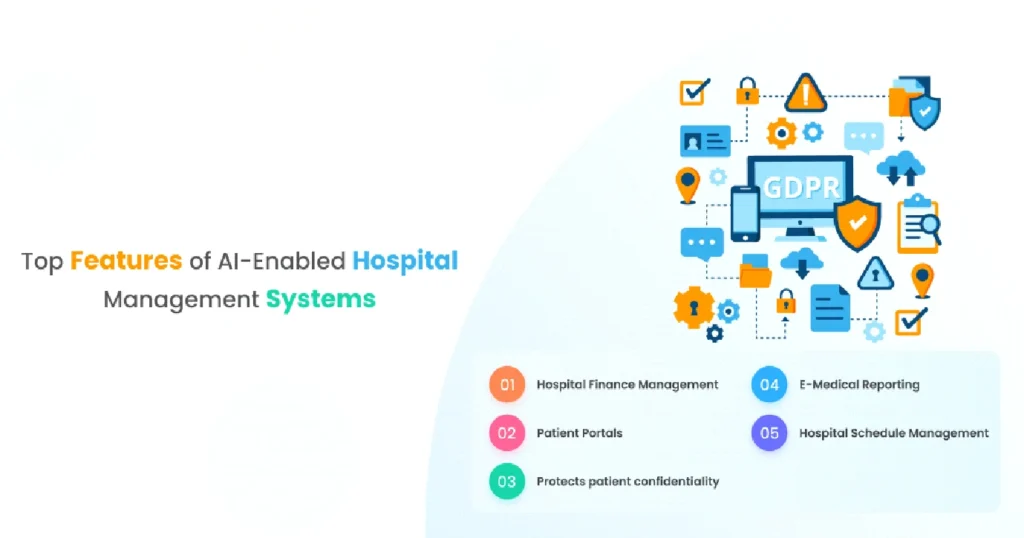
AI-enabled hospital Management System enhances hospital productivity and significantly decreases more than half of administrative expenses. Moreover, It has the power to make futuristic decisions and advance healthcare facilities. Health information technology eases the process of administrative tasks. Take a look below on the top features of hospital management information systems :
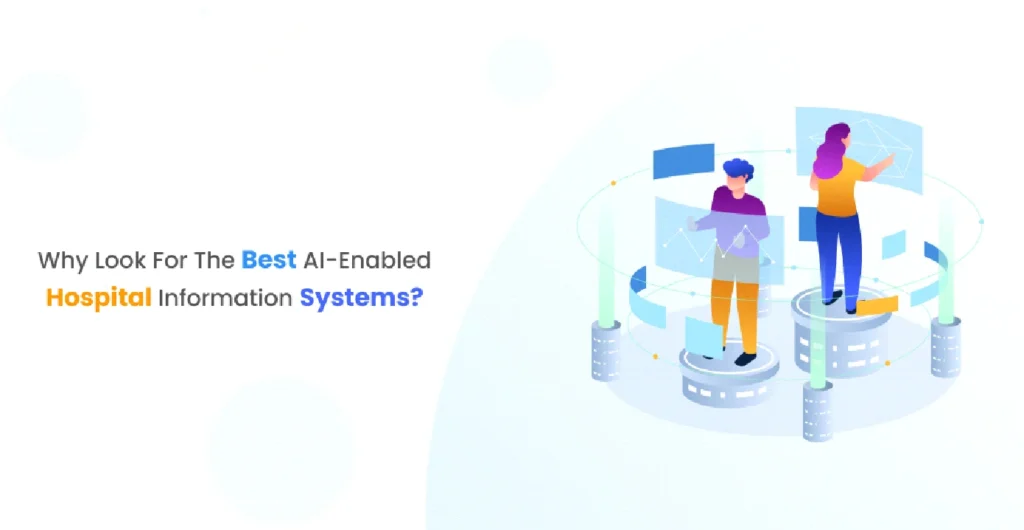
Healthray provides AI-powered hospital information systems (HMS) that revolutionize healthcare delivery by efficiently organizing and managing data. Choose the best AI system for streamlined medical information management. Furthermore, this advanced system manages healthcare data with few clicks. Not only records but also manages in a structured format and depicts the medical information in a concise format. Here are reasons for choosing the best AI-enabled hospital management system :
Artificial Intelligence incorporates various types of algorithms that correct errors, collect vast data information, and organize healthcare data in compliance with healthcare regulations. Also, it can record radiology images. Take a look below at the advantages of minimizing medical error:
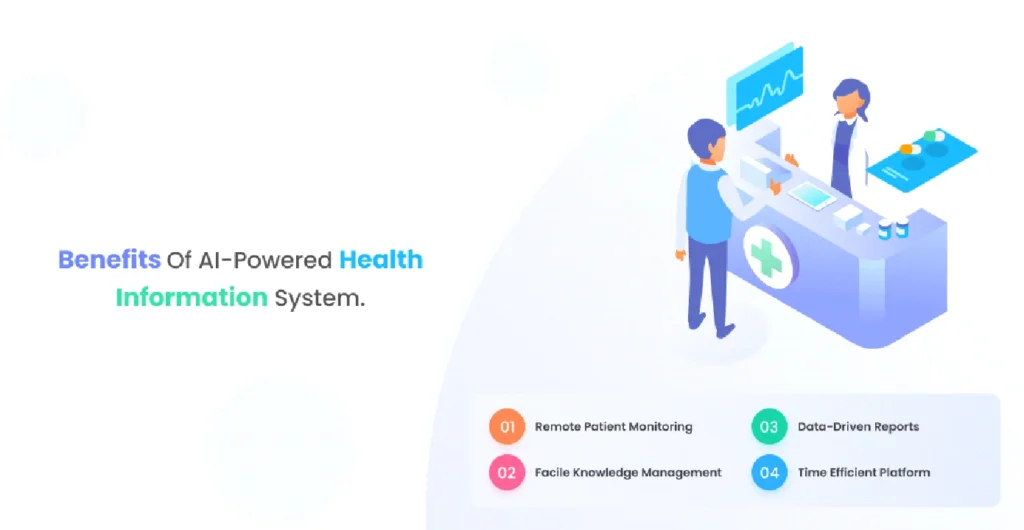
Health information systems incorporate various medical departments such as the radiology department, pathology department, laboratory department, pharmacy department, and electronic medical record department. Let’s take a look into the benefits of AI-powered health information systems :
It effectively manages entire hospital information in an accumulated format. Collect data from various sources such as electronic health records, medical clinical history, inventory database management, and medication management. Glimpse of the benefits of facile knowledge management :
Integration of electronic medical records maintains health data effectively in less time. Similarly, ease in accumulating patient health information with their treatment and surgical notes. Also, maintains patient demographics information. Let’s take a look below at the advantages of a time-efficient platform.
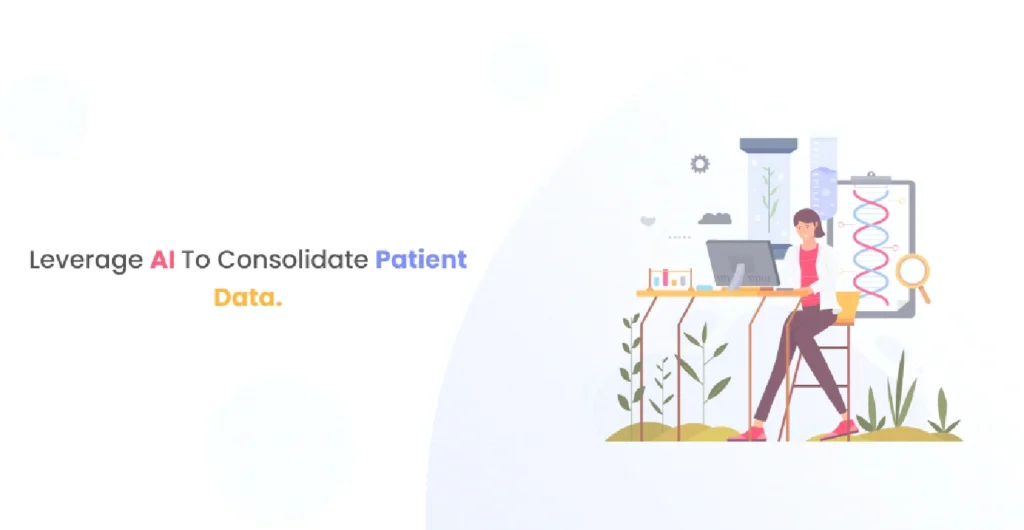
AI in healthcare has a profound impact on healthcare facilities. Incorporates different algorithms such as machine learning to simplify large amounts of datasets. Additionally, it predicts futuristic disease and aids in patient monitoring. Neural networks are being utilized to scale the software system as hospitals grow.
Hospital datasets include administrative data, electronic health records, consent forms, admission forms, and patient feedback forms. Furthermore, it incorporates patient medical documents such as radiology images, demographic details, patient’s medical history, treatment notes, and many more. Consequently, lowers treatment errors, and adheres to entire medical regulations.
All electronic documents are in a structured and organized format. Easily stores and retrieves patient information whenever required. Also, fast sharing of medical documents. Therefore, it predicts individual patient health status and medication discovery.
Revolutionize the healthcare industry with AI, Connect with Our Tagline Infotech skilled developer team can help you build a secure, efficient hospital management system. Blending artificial intelligence (AI) with hospital management systems has an exceptional impact on healthcare facilities. The top features of Healthray’s hospital management information system include hospital financial management, patient portal, and e-medical reporting. Therefore, it supports precise accounting, maintaining patient information, efficient use of medical resources, and saving hospital time. Also, maintains open coordination between medical professionals and patients.
AI in healthcare assists in effectively conducting administrative tasks that include online appointment scheduling, insurance claims, insurance verification processes, patient registration, medical billing, inventory management, and managing hospital finances. Therefore, effectively manages the hospital revenue cycle from admitted patients to final hospital payments. Take a look below on effective administrative systems :
⦁ Maintains optimum inventory level.
⦁ Effectively patient coordination.
⦁ Maintains transparency of records.
⦁ Precise medical billing.
⦁ Improved hospital facilities.
⦁ Consolidate medical information.
Automation simplifies healthcare tasks by minimizing the need for manual work and reducing human effort. Scheduling online appointments and automated reminders helps patients to minimize their medical expenses and saves time. Also, patients can receive treatment remotely without disrupting their routine tasks. Generates medical bills with the necessary structured and legal format. Glimpse on some advantages of automated healthcare tasks :
⦁ Facilitate prescription template
⦁ Medication development
⦁ Support in medical research.
⦁ Minimizes medical error
⦁ Robust Data Security.
⦁ Provides virtual consultation.
Data-driven reports refer to meaningful and actionable insights from large hospital data sets. This platform collects data from diverse sources such as electronic health records, patient portals, prescription records, medication records, clinical records, and inventory historical details. Furthermore, depicting real-time medical information which aids in quick medical decision-making. Let's delve into other added advantages of data-driven reports :
⦁ Enhancing healthcare decision making.
⦁ Allocate financial resources effectively.
⦁ Lower inventory wastage.
⦁ Reduces healthcare expenses.
⦁ Accurate patient diagnoses.
⦁ Mitigating healthcare risks.
Healthcare professionals have innumerable benefits from remote patient monitoring. It lowers hospital costs incurred on face-to-face patient visits and other infrastructural expenses. Therefore, earlier detection of severe diseases minimizes patient expenses and increases hospital efficacy.
It is useful for diverse types of healthcare specialists such as cardiologists for tracking heart rate and cardiovascular system, dermatologists for virtual skin diagnosis, neurologists for monitoring nervous disorders, and more. Here are other advantages of remote patient monitoring :
⦁ Ease in sharing healthcare documents.
⦁ Access medical information to patients.
⦁ Continuity of patients' care.
⦁ Reduces Medical Expenses.
⦁ Patients actively participate in their health.
⦁ Fast curing of critical disease.

Digital Valley, 423, Apple Square, beside Lajamni Chowk, Mota Varachha, Surat, Gujarat 394101
D-401, titanium city center, 100 feet anand nagar road, Ahmedabad-380015
+91 9913 808 2851133 Sampley Ln Leander, Texas, 78641
52 Godalming Avenue, wallington, London - SM6 8NW